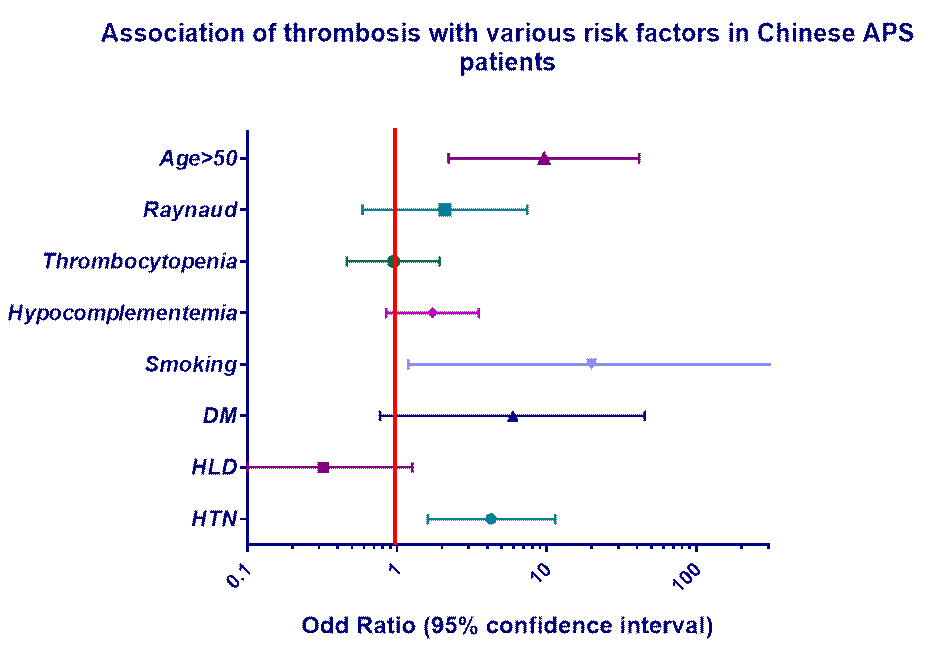Session Information
Session Type: ACR Poster Session B
Session Time: 9:00AM-11:00AM
Background/Purpose: It is well known that anti-phospholipid antibodies (aPL) are associated with an increased risk of arterial and venous thrombosis and pregnancy loss/morbidity. However, assessment of the risk associated with various antibody profiles, risks associated with aPL in the setting of other risk factors, and the evaluation of risk in individual patients are challenging issues. Our study aims to investigate the clinical and epidemiological characteristics of patients in a large APS cohort and to identify potential predictors of thrombosis and pregnancy morbidities.
Methods: This study included 180 consecutive patients who attended the rheumatology clinic at People’s Hospital of Beijing University Health Science Center. All patients fulfilled the 2006 revised APS criteria. The criteria aPL profiles [anticardiolipin (aCL), anti-β2glycoprotein-I (anti-β2GPI) and lupus anticoagulant (LA)] were assessed with an in-house assay. Complement (C3/C4) and platelet levels were assessed in a University laboratory. Hypertension (HTN) was classified based on 8th Joint National Committee (JNC-8) guidelines. Hyperlipidemia (HLD) was defined as fasting total cholesterol >200 mg/dl. Diabetes (DM) is defined as Hemoglobin A1c >7. Pearson Chi-squared or Fisher’s exact test univariate analysis with two tailed P value was used to evaluate correlation between different cardiovascular and epidemiological risk factors and clinical manifestations.
Results: 180 patients who met 2006 revised APS criteria were analyzed. There were 135 females and 45 males with a mean age of 42.85 (+/- 15.72). 66 (36.7%) patients had primary APS and 114 (63.3%) had secondary APS. Among those patients 141(78%) had thromboembolic events and 60 (33.3%) patients had recurrent thrombosis. 54 (30%) patients had pregnancy related morbidities. 59 (32.8%) patients had HTN and 28 (15.6%) were smokers. 102 (56.7%) patients exhibit hypocomplementemia and 81 (45%) exhibit thrombocytopenia. 24 (13.3%) had Raynaud’s phenomenon. Age >50 (OR=9.548, 95%CI 2.206- 41.3, P<0.00002), HTN (OR=4.221, 95%CI 1.6 – 11.4, P<0.003), and smoking (OR=19.84, 95%CI 1.182 – 332.8, P<0.0038) were significantly associated with thromboembolic events (Fig 1). HLD, DM, hypocomplementemia, and thrombocytopenia did not demonstrate significant correlation with thrombosis. Only double positive antiphospholipid antibodies (defined as patients have at least two positive criteria aPLs) were significantly associated with pregnancy morbidity. None of the other analyzed clinical characteristics showed significant correlation with obstetric manifestations.
Conclusion: A high frequency of thrombocytopenia and hypocomplementemia were observed in APS patients. Age >50, HTN, and smoking are predictors of thromboembolic events while double positive aPLs is a predictor for pregnancy morbidities in Chinese APS patients.
To cite this abstract in AMA style:
Zuo Y, Li C, Karp D, Li Z. Identifying Clinical and Epidemiological Risk Factors Associated with Thrombosis and Pregnancy Morbidity in a Large Cohort of Chinese APS Patients [abstract]. Arthritis Rheumatol. 2016; 68 (suppl 10). https://acrabstracts.org/abstract/identifying-clinical-and-epidemiological-risk-factors-associated-with-thrombosis-and-pregnancy-morbidity-in-a-large-cohort-of-chinese-aps-patients/. Accessed .« Back to 2016 ACR/ARHP Annual Meeting
ACR Meeting Abstracts - https://acrabstracts.org/abstract/identifying-clinical-and-epidemiological-risk-factors-associated-with-thrombosis-and-pregnancy-morbidity-in-a-large-cohort-of-chinese-aps-patients/

